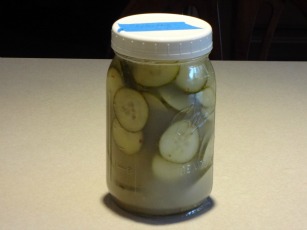Small Steps, Sensible Choices, Superior Health.
How To Take Probiotics
Search This Site:
Do you need probiotics?
Do you know how to take probiotics?
The benefits of probiotics are now becoming "main stream". I'm sure you've seen all the adds on television and in the magazines. Even Dr. Oz is promoting the benefits of probiotics.
I've been taking probiotics for many years now and hopefully I can help answer your questions by sharing what I have learned about them.
A form of probiotics has been around since ancient times.
They are called cultured or fermented foods and they are tasty foods that already contain natural probiotics.
Ancient peoples didn't have to think about how to take probiotics.
They consumed them everyday as a part of their daily meals.
Making probiotic rich foods at home is really quite simple.
Some of the more common cultured foods still being eaten today are:

Cultured dairy products:
- kefir
- cheese
- yogurt made from raw or cultured milk. Not the commercially prepared ones that are cooked, loaded with sugar and
have some bacteria added back in.
Cultured soy:
- miso
- natto
- tempeh

Pickled vegetables:
- sauerkraut
- pickles (cucumbers)
- kimchi
Fermented beverages:
- kombucha
- water kefir
Fermented meat and fish
Sourdough bread products
Fermented or cultured foods are raw, not cooked foods. The active cultures can't survive over 105 degrees.
I have made fermented cucumbers which were like dill pickles, but healthier (pictured above), beets and carrots. It was pretty easy and they were tasty too. This is the best solution when wondering how to take probiotics.
What Are Probiotics
Before we discuss more details on how to take probiotics, lets talk about what they are and why you should take them.
Probiotics are micro-organisms made up of bacteria and fungus, sometimes call the friendly flora.
We have 400-500 different strains of bacteria and fungus in our body. Our intestines are home to about 3-4 pounds of micro-organisms.
When this friendly flora lives in harmony in our body it benefits us in many ways.
Probiotic Benefits
- Creates a protective lining that coats the intestines prohibiting “unfriendly microbes” from setting up residence on your intestinal lining.
- Keeps infectious organisms in check by competing for food
- Produces chemicals that keep harmful microbes at bay
- Stimulates the immune system
- Keeps yeast (candida) in check.
- Prevents diarrhea when traveling
- Can help correct and prevent constipation or diarrhea
- Reduces the risk of inflammatory bowel disorder
- Helps end stage digestion of fats and proteins
- Helps to make vitamins the body needs like B1, B2, B6, B12, folic acid and biotin.
- Detoxifies certain poisons in the digestive tract such as ammonia, cholesterol, and excess hormones.
- Most of the energy of the intestinal mucosa is produced as a result of the bacterial fermentation process.
- That's a pretty long list of probiotic benefits!
Probiotic Destroyers
- Unfortunately there are things that can disrupt that balance of gut flora: Antibiotics
- Corticosteroids (prednisone) from the pharmacy
- Birth Control Pills
- NSAIDS, ibuprophen, aspirin, ASA, indomethacin
- Chlorine in water
Other Probiotic Distrupters
- Heavily cooked meats
- Refined sugars
- High Fructose Corn Syrup
- Refined grains
- Hydrogenated fats and oils
- Stress
Who Needs Probiotics
It is believed that 70-90% of our immune system comes from our gut. So in order to stay healthy, we need a healthy gut, to have a healthy gut, you need probiotics. But the people who are most at risk and really need probiotics are:
- Anyone with skin problems
- People, especially kids with food or respiratory allergies
- People who have yeast issues of any kind, like athlete's foot, jock itch, vaginal yeast infection, nail fungus and dandruff
- Anyone with a weakened immune system, frequent colds, infections and congestion
- People who travel for protection from food and water
- Anyone with inflammatory bowel disorders and constipation
- Infants and children to reduce incidence of infection. (especially c-section babies who didn't pick up any of Mom's flora when passing through the birth canal.
Answers on How To Take Probiotics
Can I take probiotics while taking antibiotics?
Antibiotics kill both the bad bacteria and the good bacteria in your body. So it's very important to re-establish the good bacteria with probiotics.
Yes, you can take them while you are on antibiotics. Just make sure you take them about 2-3 hours apart from the antibiotic.
You don't want the antibiotic to kill off the good bacteria in your probiotics.
When should I take Probiotics?
Probiotics are best taken on an empty stomach rather than with your meals. The increased stomach acid necessary to digest your food will also kill of your probiotics.
It's best to take them right before bed while your stomach is empty. If you take them upon rising, wait 20 minutes or so before eating or drinking.
If your probiotic bottle says to take with meals it is because the FDA requires that statement to be put on all supplements.
What choices do I have in Probiotics?
You basically have two choices on how to take probiotics. You can either:
- eat fermented foods everyday
- or you can take a supplement
What do I look for in a Probiotic Supplement?
Probiotic supplements will vary based on the different manufacturers so always look for a high quality source. The two most common strains found in probiotics are:
- Lactobacillus Acidophilus
- Bifidophilus Longum.
Other strains found include:
- Lcasei, L rhamnosus, B. bifidus, L brevis, L bulgaricus, L plantarum, B. infantis, L salivarius.
Many will also contain prebiotics which are "foods" for the probiotics.
How do I know if I'm getting enough Probiotics?
You can take a short questionnaire on Probiotic Pills. You can find the link in the Additional Resources below.
Do I have to refrigerate my Probiotics?
In addition to learning how to take probiotics, you should also be aware of how to store them. Heat will destroy the active strains so it's wise to store them in the refrigerator or freezer.
However, if you're traveling and don't have the ability to keep them in the refrigerator, take them anyway. Some live probiotics are better than none at all.
How often do I need Probiotics?
Just like food, take a supplement or eat cultured foods daily. It's important to the keeping the beneficial balance of flora in the intestines.
It's important to always take probiotics:
- after colonics
- while taking antibiotics
- while doing a cleanse
I used to take a probiotic supplement but now I eat a lot of cultured and fermented foods that contain the best source of probiotics.
I hope this page helped to answer some of the questions you may have had on how to take probiotics.
Please review the links below in the Additional Resources section.
Additional Resources
Questionnaire on Probiotic Pills

New! Comments
Let me know what you think! Please leave me a comment in the box below.